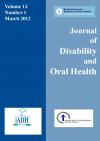Journal of Disability and Oral Health

- Cover Date:
- March 2012
- Print ISSN:
- 1470-855
- Vol:
- 13
- Issue:
- 1
Editorial - Encouraging wider participation and engagement
Journal of Disability and Oral Health (2012) 13/1 02
Editorial - Encouraging wider participation and engagement
The Journal of Disability and Oral Health continues to encourage wider engagement with disabled people, together with partners in health, social care and policy makers to enable publication of original work relating to all aspects relevant to the comprehensive oral care of people with disabilities. JDOH strives to be an important mode of communication for members of the dental team informing a wider group of professionals with an interest in promoting the oral health of people with disabilities. Research in Special Care Dentistry should address the most pertinent oral health issues faced by disabled people. The Office for Disability Issues, HM Government UK has produced an exemplar within social research on involvement of disabled people in government social research, Involving Disabled People in Social Research Guidance by the Office for Disability Issues by Martin Farmer and Fraser Macleod August 2011 ISBN 978-184947-711-6. This guidance may be useful within Special Care Dentistry, as evidence suggests that social research on disability issues fails to focus on issues of greatest relevance to disabled people (Barnes et al., 2003). Academics from the field of disability contend disabled people should be involved from the beginning in formulating research questions, help with developing methodology and aid in ensuring data collection is accessible and inclusive to disabled people. Advice is valuable for interpreting results and drawing conclusions that improve quality of data whilst reflecting the views and experiences of people with disabilities. Furthermore, research presented in an accessible way to people with different types of impairments could avoid the potential for lack of engagement, arising from inaccessible research findings that are possibly not acted upon. Development of research groups that identify and explore issues using first-hand experience of disabled people to develop research questions should be encouraged. Engagement with disabled partners allows consideration of legal issues enshrined in The Equality Duty (Equality Act 2010) whereby public bodies must ‘pay due regard’ to advance equality, eliminate discrimination, and foster good relations. This is equally true in terms of research in disability issues related to oral healthcare. In this issue, authors have adopted a child centred approach to reduce dental anxiety amongst children with complex and additional support needs using a Dental Playbox involving their families. The oral health status and behaviour of employed people with intellectual disability is investigated with development of strategies and programmes to increase the preparedness of general den-
tists to provide oral care and improve oral health. Examination into access and waiting times for specialist services in a dental hospital suggest areas for further research, correlation of patient attendance with degree of disability and how to establish criteria to prioritise treatment for those in greatest need of oral care. Development in education and training courses and publication of acceptance criteria should improve access to secondary and tertiary care and improve access to primary care. Evidence for further undergraduate education in Special Care Dentistry is demonstrated by examination of the adequacy of special care education of dental students in Saudi Arabia, through their willingness and confidence to treat patients with special needs. It is a sign of the times that we all have numerous commitments and priorities in providing services and education in Special Care Dentistry, however, we must not forget to encourage partnership with the wider community of disabled people to address those research priorities that matter most. ‘Research is to see what everybody else has seen, and to think what nobody else has thought’, Albert SzentGyorgyi. Shelagh Thompson, Cardiff
References
Barnes C, Mercer G (Eds). Doing Disability Research. The Disability Press, 1997. http://www.leeds.ac.uk/disability-studies/books/book3.htm Research Review on User Involvement in Promoting Change and Enhancing the Quality of Social ‘Care’ Services for Disabled People. C Barnes, G Mercer, I Din, Centre for Disability Studies, University of Leeds, 2003.
Erratum Please note the iADH 2012 21st Congress in Melbourne, Australia is on 28-31 October 2012 and not as stated in the Diary Page on page 176 in JDOH (2011) 12/4.
- Article Price
- £15.00
- Institution Article Price
- £
- Page Start
- 2
- Page End
- 2
- Authors
Articles from this issue
- Title
- Pg. Start
- Pg. End
- Measuring dental anxiety in children with complex and additional support needs using the Modified Child Dental Anxiety Scale (faces) (MCDASf)
- 3
- 10
- The oral health status and behaviour among non-institutionalised employed adults with intellectual disabilities
- 11
- 18
- Saudi dental students’ perception of their education in Special Care Dentistry and its effect on their confidence to render care
- 19
- 25
- Access to care waiting times for special care patients accessing specialist services in a dental hospital
- 27
- 34
